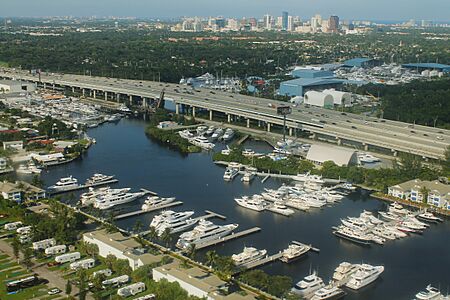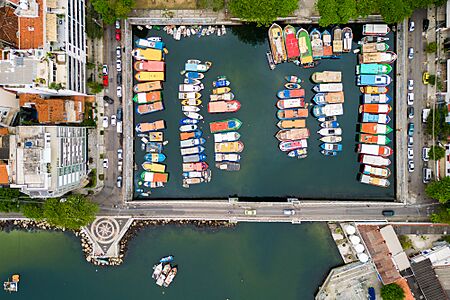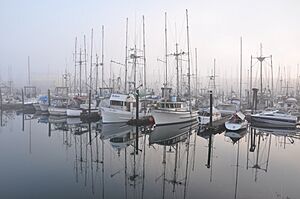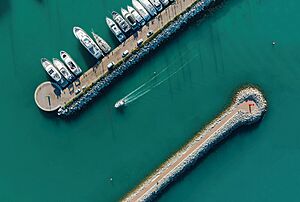Marina facts for kids

A marina is a special place on the water where people keep their small boats and yachts. Think of it like a parking lot for boats! The word "marina" comes from Spanish, Portuguese, and Italian words that mean "related to the sea."
Marinas are different from large ports. Ports handle huge cargo ships and big passenger liners. Marinas, on the other hand, are just for smaller boats used for fun, like sailing or fishing. Sometimes, a marina can even be found on a river or canal far from the sea. These inland marinas are also for pleasure boats, such as narrowboats on canals.
Contents
Where Are Marinas Located?
Marinas can be found in many different places. Some are built along the banks of rivers that connect to larger lakes or the sea. Others are located right on the coast, in natural bays or man-made harbors. You might see them as a single facility or as part of a bigger port area. They can also be in coastal lagoons, which are shallow bodies of water separated from the ocean by a barrier.
A Brief History of Marinas
For a long time, in the 1800s, people who owned boats for fun had to share the same docks and facilities as big trading ships and fishing vessels. It wasn't until the 1900s that marinas, as we know them today, started to appear. This happened because more and more people became interested in yachting, which is sailing or cruising in a yacht for pleasure. As recreational boating grew, there was a need for dedicated places just for these smaller, fun boats.
What Can You Find at a Marina?
Marinas offer many helpful things for boat owners. Here are some of the main facilities and services:
- Fuel and Repairs: You can refuel your boat, get it washed, or have repairs done if something breaks.
- Boat Supplies: Marinas often have special stores called "chandlers" that sell everything a boat owner might need, from ropes and anchors to safety gear.
- Food and Shops: Many marinas have restaurants, cafes, and other shops where people can relax and buy things.
- Parking: There are usually parking lots for cars and trailers, especially for boats that are pulled out of the water.
- Boat Ramps: These are sloped areas, also called slipways, that allow you to easily put a boat on a trailer into the water or pull it out.
- Travel Lifts: For heavier boats, marinas use a special crane called a travel lift. This machine can lift boats out of the water and move them around on land for storage or repairs.
- Boat Storage: Marinas offer places to store boats both in the water (called a berth) and out of the water on land.
Many services, like using picnic areas or showers, are often included if you rent a spot for your boat for a long time. If you're just visiting for a short period, you can usually pay for these services as you need them. Because space at marinas can be limited, it sometimes takes a long time to get a permanent spot for your boat. People might even be on a waiting list for years!
How Boats Are Moored and Accessed
Boats at a marina are kept in place in a few ways:
- Buoys: Some boats are tied to large floating markers called buoys. This is often a cheaper option.
- Docks: Most boats are tied to docks or walkways. These can be fixed (stay in one place) or floating (move up and down with the water level). Floating docks are often called pontoons. They are connected to strong poles called pilings that are driven into the seabed.
If your boat is tied to a buoy, you might need a small boat called a "tender" (like an inflatable boat) to get to it from the shore. Some marinas also have "harbor shuttles" or "water taxis" that can take people to their boats. Marinas usually have a special dock for short-term parking if you just need to quickly get fuel or visit a store.
In places where the water level changes a lot with the tides, marinas might use locks. These are like water elevators that help keep the water level inside the marina steady, even when the tide outside goes very low.
Who Owns and Operates Marinas?
Marinas can be owned and managed by different groups. Some are run by private clubs, like yacht clubs, which are groups of people who enjoy boating. Others are private businesses that operate to make a profit. Many marinas are also owned and operated by local governments or public organizations. Sometimes, a marina might even be part of a larger resort or hotel complex.
See also
 In Spanish: Puerto deportivo para niños
In Spanish: Puerto deportivo para niños
- List of marinas
 | Emma Amos |
 | Edward Mitchell Bannister |
 | Larry D. Alexander |
 | Ernie Barnes |




